By Christian Kronsted · Tuesday, August 13, 2013 As an occasional feature on TELOSscope, we highlight a past Telos article whose critical insights continue to illuminate our thinking and challenge our assumptions. Today, Christian Kronsted looks at Lowell A. Dunlap’s “Hume, James, and Husserl on the Self,” from Telos 2 (Fall 1968).
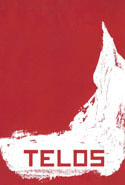 With the publication of A Treatise Of Human Nature, David Hume turned the philosophical community of his time upside down with his provocative skepticism and denial of a cohesive self. Since its initial publication, Hume’s claim that the self is nothing but a bundle of perceptions has plagued philosophers and psychologists alike, and has inspired many to completely abandon the idea of a coherent self. Yet a central question remains largely unanswered: if there is not a self, what is doing the thinking, and how is it done? If a person does not have a “self,” how come human beings think of themselves as unique and separate entities that have subjective experiences? Lowell A. Dunlap’s article “Hume, James, and Husserl on the Self” investigates how William James and Edmund Husserl tackled the notion of personal identity in the aftermath of Hume’s philosophy. With the publication of A Treatise Of Human Nature, David Hume turned the philosophical community of his time upside down with his provocative skepticism and denial of a cohesive self. Since its initial publication, Hume’s claim that the self is nothing but a bundle of perceptions has plagued philosophers and psychologists alike, and has inspired many to completely abandon the idea of a coherent self. Yet a central question remains largely unanswered: if there is not a self, what is doing the thinking, and how is it done? If a person does not have a “self,” how come human beings think of themselves as unique and separate entities that have subjective experiences? Lowell A. Dunlap’s article “Hume, James, and Husserl on the Self” investigates how William James and Edmund Husserl tackled the notion of personal identity in the aftermath of Hume’s philosophy.
Continue reading →
By J. F. Dorahy · Tuesday, April 16, 2013 As an occasional feature on TELOSscope, we highlight a past Telos article whose critical insights continue to illuminate our thinking and challenge our assumptions. Today, J. F. Dorahy looks at Joel Whitebook’s “Saving the Subject: Modernity and the Problem of the Autonomous Individual,” from Telos 50 (Winter 1981).
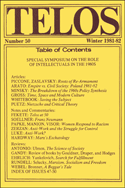 Autonomy is, arguably, the most fundamental concept in the discursive constellation of modernity. If it is apposite, and I believe it is, to think in terms of the differentiation between political, socio-economic, and cultural modernities, then it is clear that the concept of autonomy—either with reference to the autonomous individual or the autonomous work of art—is a constitutive force within each sphere. In “Saving the Subject: Modernity and the Problem of the Autonomous Individual,” Joel Whitebook offers a historically nuanced overview of the difficulties involved in thinking the “autonomous individual” under the conditions of a dynamic and increasingly complex modernity. Whitebook’s piece is wide-ranging and fuses a deep psychoanalytic insight with a robust sociological consciousness: a fusion that accompanies, to my mind, the best critical theory. To be sure, the many subtleties and divergences that emerge from Whitebook’s dialectic are resistant to a full reconstruction within this preview. Rather, I would like to simplify Whitebook’s account by drawing out the three historical epochs examined by Whitebook and say a few things regarding the key aspects of Whitebook’s reading of Marx and Freud and Adorno and Habermas as thinkers who most significantly appreciate the problematic nature of the modern, autonomous individual. Finally, I conclude by arguing for the innovative character of Whitebook’s thoughts regarding the centrality of affective relationships in the formation of the autonomous individual. Autonomy is, arguably, the most fundamental concept in the discursive constellation of modernity. If it is apposite, and I believe it is, to think in terms of the differentiation between political, socio-economic, and cultural modernities, then it is clear that the concept of autonomy—either with reference to the autonomous individual or the autonomous work of art—is a constitutive force within each sphere. In “Saving the Subject: Modernity and the Problem of the Autonomous Individual,” Joel Whitebook offers a historically nuanced overview of the difficulties involved in thinking the “autonomous individual” under the conditions of a dynamic and increasingly complex modernity. Whitebook’s piece is wide-ranging and fuses a deep psychoanalytic insight with a robust sociological consciousness: a fusion that accompanies, to my mind, the best critical theory. To be sure, the many subtleties and divergences that emerge from Whitebook’s dialectic are resistant to a full reconstruction within this preview. Rather, I would like to simplify Whitebook’s account by drawing out the three historical epochs examined by Whitebook and say a few things regarding the key aspects of Whitebook’s reading of Marx and Freud and Adorno and Habermas as thinkers who most significantly appreciate the problematic nature of the modern, autonomous individual. Finally, I conclude by arguing for the innovative character of Whitebook’s thoughts regarding the centrality of affective relationships in the formation of the autonomous individual.
Continue reading →
By Russell A. Berman · Monday, March 18, 2013 Telos 162 (Spring 2013) is now available for purchase in our store.
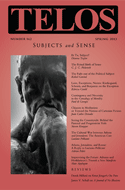 At its inception, Telos pursued a specific project as a journal: to serve as a bridge between the world of what was then often referred to as “European theory” and a U.S. intellectual world largely defined by quantitative methods in the social sciences. Over time, the terminology changed, and it is now more common to use the parlance of “analytic” and “continental” modes of philosophy, and if the latter term still clearly points toward Europe, there are representatives of both trends in the university lives on both sides of the Atlantic. In retrospect, however, the question for Telos was never one of a simple cultural transfer or the pursuit of some intellectual equilibrium in which scholars in both worlds would think the same way. On the contrary, instead of thinking about method in general, at stake for Telos was the difference between reflections on the meaning of the human condition, thoughtful explorations of the good life, and what appeared to be an exclusively numerical measuring of the status quo, a positivist description of what already exists, with no expectation of change. At its inception, Telos pursued a specific project as a journal: to serve as a bridge between the world of what was then often referred to as “European theory” and a U.S. intellectual world largely defined by quantitative methods in the social sciences. Over time, the terminology changed, and it is now more common to use the parlance of “analytic” and “continental” modes of philosophy, and if the latter term still clearly points toward Europe, there are representatives of both trends in the university lives on both sides of the Atlantic. In retrospect, however, the question for Telos was never one of a simple cultural transfer or the pursuit of some intellectual equilibrium in which scholars in both worlds would think the same way. On the contrary, instead of thinking about method in general, at stake for Telos was the difference between reflections on the meaning of the human condition, thoughtful explorations of the good life, and what appeared to be an exclusively numerical measuring of the status quo, a positivist description of what already exists, with no expectation of change.
Continue reading →
By Juan Carlos Donado · Friday, March 8, 2013 The following paper was presented at the Seventh Annual Telos Conference, held on February 15–17, 2013, in New York City.
 Much has certainly been said about the place of otherness in René Descartes’ Meditations on First Philosophy. But one could, or rather, should be more precise and determine that the majority of what has been said about otherness in Descartes’ opus magnum concerns an essential banishment of the other, not to call it an essential exclusion, at the face of the “I.” In a text that, as some would have it, inaugurates the age we call Modern and starting with its genre, critics have no problem directly drawing a line from the monological voice that gives rise to the Modern subject to the egocentricity that perhaps best characterizes an age in which the mechanization of Nature—if we are still to be called Moderns—is rapidly coinciding with its destruction. As if the question of genre in the Meditations were not one of extreme complexity, the monologue, or so the story goes, finally replaces dialogue as the genre of Modernity and the other, slowly fading away, loses its voice under the authoritarian submission to the monophonic first-person singular. Much has certainly been said about the place of otherness in René Descartes’ Meditations on First Philosophy. But one could, or rather, should be more precise and determine that the majority of what has been said about otherness in Descartes’ opus magnum concerns an essential banishment of the other, not to call it an essential exclusion, at the face of the “I.” In a text that, as some would have it, inaugurates the age we call Modern and starting with its genre, critics have no problem directly drawing a line from the monological voice that gives rise to the Modern subject to the egocentricity that perhaps best characterizes an age in which the mechanization of Nature—if we are still to be called Moderns—is rapidly coinciding with its destruction. As if the question of genre in the Meditations were not one of extreme complexity, the monologue, or so the story goes, finally replaces dialogue as the genre of Modernity and the other, slowly fading away, loses its voice under the authoritarian submission to the monophonic first-person singular.
Continue reading →
By J. F. Dorahy · Tuesday, January 15, 2013 As an occasional feature on TELOSscope, we highlight a past Telos article whose critical insights continue to illuminate our thinking and challenge our assumptions. Today, J. F. Dorahy looks at Agnes Heller’s “The Marxist Theory of Revolution and the Revolution of Everyday Life,” from Telos 6 (Fall 1970).
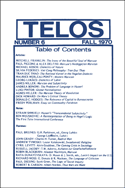 The category of “everyday life” is a relatively new addition to the critical framework of Marxism. Since it was formally introduced by the French theorist Henri Lefèbvre (Critique de la vie quotidienne I, 1947; The Critique of Everyday Life, 1991), the critique of everyday life emerged in the post-1945 period as a response to the continuing stability of late capitalism and the integration of formerly radical elements of society within its logic of containment. From within the orbit of “actually existing socialism,” Agnes Heller’s critical anthropology of everyday life illuminates the integrative tendencies of both “great systems” during the Cold War via the prism of the alienated personality. While “The Marxist Theory of Revolution and the Revolution of Everyday Life” touches on numerous practical issues confronting the radical political movements on the late-1960s—including analysis of the ideological relevance of Che Guevara and the role of the sexual liberation movement in the formation non-alienated communities—its greatest and most enduring aspect is Heller’s focused and concise delineation of the phenomenology of personhood in the world-historical epoch of alienation. The category of “everyday life” is a relatively new addition to the critical framework of Marxism. Since it was formally introduced by the French theorist Henri Lefèbvre (Critique de la vie quotidienne I, 1947; The Critique of Everyday Life, 1991), the critique of everyday life emerged in the post-1945 period as a response to the continuing stability of late capitalism and the integration of formerly radical elements of society within its logic of containment. From within the orbit of “actually existing socialism,” Agnes Heller’s critical anthropology of everyday life illuminates the integrative tendencies of both “great systems” during the Cold War via the prism of the alienated personality. While “The Marxist Theory of Revolution and the Revolution of Everyday Life” touches on numerous practical issues confronting the radical political movements on the late-1960s—including analysis of the ideological relevance of Che Guevara and the role of the sexual liberation movement in the formation non-alienated communities—its greatest and most enduring aspect is Heller’s focused and concise delineation of the phenomenology of personhood in the world-historical epoch of alienation.
Continue reading →
By Sevgi Doğan · Monday, November 26, 2012 This paper was presented at Telos in Europe: The L’Aquila Conference, held on September 7-9, 2012, in L’Aquila, Italy.
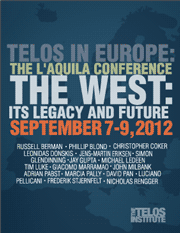 The argument of this paper is inspired by the actual problem of the individual in the modern state, in other words, the relationship between the political life and the individual, or the relation of the individual with politics. The thesis would claim that the individual as one of the fundamental features of modern times does not exist—or is not considered—as political agent although the modern political institution is based on the existence of the individual with its economic, social, and political rights. In this context, the individual exists only as consumer both for him/herself and for another (capitalist) and as a producer for another (capitalist) but not as a creator for him/herself. Marx talks about the production and consumption dialectic in the “Introduction” to Grundrisse (1858, published 1939). In this context a brief survey is presented here of some well-known early writings of Marx in an effort to outline how this dialectic is revealed for the difference between Marx’s and Hegel’s philosophical perspectives of the individual existence. The statement claiming that Marx does not discuss the concept of individual as Hegel does is a delusion. The argument of this paper is inspired by the actual problem of the individual in the modern state, in other words, the relationship between the political life and the individual, or the relation of the individual with politics. The thesis would claim that the individual as one of the fundamental features of modern times does not exist—or is not considered—as political agent although the modern political institution is based on the existence of the individual with its economic, social, and political rights. In this context, the individual exists only as consumer both for him/herself and for another (capitalist) and as a producer for another (capitalist) but not as a creator for him/herself. Marx talks about the production and consumption dialectic in the “Introduction” to Grundrisse (1858, published 1939). In this context a brief survey is presented here of some well-known early writings of Marx in an effort to outline how this dialectic is revealed for the difference between Marx’s and Hegel’s philosophical perspectives of the individual existence. The statement claiming that Marx does not discuss the concept of individual as Hegel does is a delusion.
Continue reading →
|
|
 With the publication of A Treatise Of Human Nature, David Hume turned the philosophical community of his time upside down with his provocative skepticism and denial of a cohesive self. Since its initial publication, Hume’s claim that the self is nothing but a bundle of perceptions has plagued philosophers and psychologists alike, and has inspired many to completely abandon the idea of a coherent self. Yet a central question remains largely unanswered: if there is not a self, what is doing the thinking, and how is it done? If a person does not have a “self,” how come human beings think of themselves as unique and separate entities that have subjective experiences? Lowell A. Dunlap’s article “Hume, James, and Husserl on the Self” investigates how William James and Edmund Husserl tackled the notion of personal identity in the aftermath of Hume’s philosophy.
With the publication of A Treatise Of Human Nature, David Hume turned the philosophical community of his time upside down with his provocative skepticism and denial of a cohesive self. Since its initial publication, Hume’s claim that the self is nothing but a bundle of perceptions has plagued philosophers and psychologists alike, and has inspired many to completely abandon the idea of a coherent self. Yet a central question remains largely unanswered: if there is not a self, what is doing the thinking, and how is it done? If a person does not have a “self,” how come human beings think of themselves as unique and separate entities that have subjective experiences? Lowell A. Dunlap’s article “Hume, James, and Husserl on the Self” investigates how William James and Edmund Husserl tackled the notion of personal identity in the aftermath of Hume’s philosophy.  Autonomy is, arguably, the most fundamental concept in the discursive constellation of modernity. If it is apposite, and I believe it is, to think in terms of the differentiation between political, socio-economic, and cultural modernities, then it is clear that the concept of autonomy—either with reference to the autonomous individual or the autonomous work of art—is a constitutive force within each sphere. In “Saving the Subject: Modernity and the Problem of the Autonomous Individual,” Joel Whitebook offers a historically nuanced overview of the difficulties involved in thinking the “autonomous individual” under the conditions of a dynamic and increasingly complex modernity. Whitebook’s piece is wide-ranging and fuses a deep psychoanalytic insight with a robust sociological consciousness: a fusion that accompanies, to my mind, the best critical theory. To be sure, the many subtleties and divergences that emerge from Whitebook’s dialectic are resistant to a full reconstruction within this preview. Rather, I would like to simplify Whitebook’s account by drawing out the three historical epochs examined by Whitebook and say a few things regarding the key aspects of Whitebook’s reading of Marx and Freud and Adorno and Habermas as thinkers who most significantly appreciate the problematic nature of the modern, autonomous individual. Finally, I conclude by arguing for the innovative character of Whitebook’s thoughts regarding the centrality of affective relationships in the formation of the autonomous individual.
Autonomy is, arguably, the most fundamental concept in the discursive constellation of modernity. If it is apposite, and I believe it is, to think in terms of the differentiation between political, socio-economic, and cultural modernities, then it is clear that the concept of autonomy—either with reference to the autonomous individual or the autonomous work of art—is a constitutive force within each sphere. In “Saving the Subject: Modernity and the Problem of the Autonomous Individual,” Joel Whitebook offers a historically nuanced overview of the difficulties involved in thinking the “autonomous individual” under the conditions of a dynamic and increasingly complex modernity. Whitebook’s piece is wide-ranging and fuses a deep psychoanalytic insight with a robust sociological consciousness: a fusion that accompanies, to my mind, the best critical theory. To be sure, the many subtleties and divergences that emerge from Whitebook’s dialectic are resistant to a full reconstruction within this preview. Rather, I would like to simplify Whitebook’s account by drawing out the three historical epochs examined by Whitebook and say a few things regarding the key aspects of Whitebook’s reading of Marx and Freud and Adorno and Habermas as thinkers who most significantly appreciate the problematic nature of the modern, autonomous individual. Finally, I conclude by arguing for the innovative character of Whitebook’s thoughts regarding the centrality of affective relationships in the formation of the autonomous individual.  At its inception, Telos pursued a specific project as a journal: to serve as a bridge between the world of what was then often referred to as “European theory” and a U.S. intellectual world largely defined by quantitative methods in the social sciences. Over time, the terminology changed, and it is now more common to use the parlance of “analytic” and “continental” modes of philosophy, and if the latter term still clearly points toward Europe, there are representatives of both trends in the university lives on both sides of the Atlantic. In retrospect, however, the question for Telos was never one of a simple cultural transfer or the pursuit of some intellectual equilibrium in which scholars in both worlds would think the same way. On the contrary, instead of thinking about method in general, at stake for Telos was the difference between reflections on the meaning of the human condition, thoughtful explorations of the good life, and what appeared to be an exclusively numerical measuring of the status quo, a positivist description of what already exists, with no expectation of change.
At its inception, Telos pursued a specific project as a journal: to serve as a bridge between the world of what was then often referred to as “European theory” and a U.S. intellectual world largely defined by quantitative methods in the social sciences. Over time, the terminology changed, and it is now more common to use the parlance of “analytic” and “continental” modes of philosophy, and if the latter term still clearly points toward Europe, there are representatives of both trends in the university lives on both sides of the Atlantic. In retrospect, however, the question for Telos was never one of a simple cultural transfer or the pursuit of some intellectual equilibrium in which scholars in both worlds would think the same way. On the contrary, instead of thinking about method in general, at stake for Telos was the difference between reflections on the meaning of the human condition, thoughtful explorations of the good life, and what appeared to be an exclusively numerical measuring of the status quo, a positivist description of what already exists, with no expectation of change.  Much has certainly been said about the place of otherness in René Descartes’ Meditations on First Philosophy. But one could, or rather, should be more precise and determine that the majority of what has been said about otherness in Descartes’ opus magnum concerns an essential banishment of the other, not to call it an essential exclusion, at the face of the “I.” In a text that, as some would have it, inaugurates the age we call Modern and starting with its genre, critics have no problem directly drawing a line from the monological voice that gives rise to the Modern subject to the egocentricity that perhaps best characterizes an age in which the mechanization of Nature—if we are still to be called Moderns—is rapidly coinciding with its destruction. As if the question of genre in the Meditations were not one of extreme complexity, the monologue, or so the story goes, finally replaces dialogue as the genre of Modernity and the other, slowly fading away, loses its voice under the authoritarian submission to the monophonic first-person singular.
Much has certainly been said about the place of otherness in René Descartes’ Meditations on First Philosophy. But one could, or rather, should be more precise and determine that the majority of what has been said about otherness in Descartes’ opus magnum concerns an essential banishment of the other, not to call it an essential exclusion, at the face of the “I.” In a text that, as some would have it, inaugurates the age we call Modern and starting with its genre, critics have no problem directly drawing a line from the monological voice that gives rise to the Modern subject to the egocentricity that perhaps best characterizes an age in which the mechanization of Nature—if we are still to be called Moderns—is rapidly coinciding with its destruction. As if the question of genre in the Meditations were not one of extreme complexity, the monologue, or so the story goes, finally replaces dialogue as the genre of Modernity and the other, slowly fading away, loses its voice under the authoritarian submission to the monophonic first-person singular.  The category of “everyday life” is a relatively new addition to the critical framework of Marxism. Since it was formally introduced by the French theorist Henri Lefèbvre (Critique de la vie quotidienne I, 1947; The Critique of Everyday Life, 1991), the critique of everyday life emerged in the post-1945 period as a response to the continuing stability of late capitalism and the integration of formerly radical elements of society within its logic of containment. From within the orbit of “actually existing socialism,” Agnes Heller’s critical anthropology of everyday life illuminates the integrative tendencies of both “great systems” during the Cold War via the prism of the alienated personality. While “The Marxist Theory of Revolution and the Revolution of Everyday Life” touches on numerous practical issues confronting the radical political movements on the late-1960s—including analysis of the ideological relevance of Che Guevara and the role of the sexual liberation movement in the formation non-alienated communities—its greatest and most enduring aspect is Heller’s focused and concise delineation of the phenomenology of personhood in the world-historical epoch of alienation.
The category of “everyday life” is a relatively new addition to the critical framework of Marxism. Since it was formally introduced by the French theorist Henri Lefèbvre (Critique de la vie quotidienne I, 1947; The Critique of Everyday Life, 1991), the critique of everyday life emerged in the post-1945 period as a response to the continuing stability of late capitalism and the integration of formerly radical elements of society within its logic of containment. From within the orbit of “actually existing socialism,” Agnes Heller’s critical anthropology of everyday life illuminates the integrative tendencies of both “great systems” during the Cold War via the prism of the alienated personality. While “The Marxist Theory of Revolution and the Revolution of Everyday Life” touches on numerous practical issues confronting the radical political movements on the late-1960s—including analysis of the ideological relevance of Che Guevara and the role of the sexual liberation movement in the formation non-alienated communities—its greatest and most enduring aspect is Heller’s focused and concise delineation of the phenomenology of personhood in the world-historical epoch of alienation.  The argument of this paper is inspired by the actual problem of the individual in the modern state, in other words, the relationship between the political life and the individual, or the relation of the individual with politics. The thesis would claim that the individual as one of the fundamental features of modern times does not exist—or is not considered—as political agent although the modern political institution is based on the existence of the individual with its economic, social, and political rights. In this context, the individual exists only as consumer both for him/herself and for another (capitalist) and as a producer for another (capitalist) but not as a creator for him/herself. Marx talks about the production and consumption dialectic in the “Introduction” to Grundrisse (1858, published 1939). In this context a brief survey is presented here of some well-known early writings of Marx in an effort to outline how this dialectic is revealed for the difference between Marx’s and Hegel’s philosophical perspectives of the individual existence. The statement claiming that Marx does not discuss the concept of individual as Hegel does is a delusion.
The argument of this paper is inspired by the actual problem of the individual in the modern state, in other words, the relationship between the political life and the individual, or the relation of the individual with politics. The thesis would claim that the individual as one of the fundamental features of modern times does not exist—or is not considered—as political agent although the modern political institution is based on the existence of the individual with its economic, social, and political rights. In this context, the individual exists only as consumer both for him/herself and for another (capitalist) and as a producer for another (capitalist) but not as a creator for him/herself. Marx talks about the production and consumption dialectic in the “Introduction” to Grundrisse (1858, published 1939). In this context a brief survey is presented here of some well-known early writings of Marx in an effort to outline how this dialectic is revealed for the difference between Marx’s and Hegel’s philosophical perspectives of the individual existence. The statement claiming that Marx does not discuss the concept of individual as Hegel does is a delusion. 

